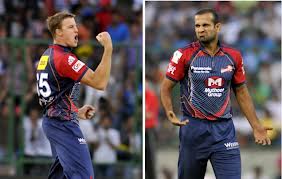
After their not so memorable outing in the just-concluded ICC World T20 in Sri Lanka, it will be a test of character for the Indian players in the Champions League Twenty20 which enters the business end on Saturday.
There are four Indian Premier League teams in the fray in the cash-rich tournament, including defending champion Mumbai Indians (MI) and this season’s IPL winner Kolkata Knight Riders (KKR).
The other two IPL sides are former champion Chennai Super Kings (CSK) and Delhi Daredvils (DD).
It would be interesting to watch the earnestness of the Indian cricketers, eager to erase the scars of their Super Eight elimination in the ICC World Twenty20.
While KKR and DD have been placed in Group A, the other two are in Group B, raising hopes of an all India clash in the semifinals, as the top two teams from each group will qualify for the knockout stage.
However, in no sense it would be an easy task for the Indian outfits as they will be up against some of the best T20 outfits of the world.
Classy line-ups
And with Titans and Highveld Lions, both from South Africa, enjoying home advantage, the task for the Indian units will be even more cut out.
Apart from the two African teams, the championship also has Australia’s Perth Scorchers, which boasts of players like Shaun Marsh and Herschelle Gibbs.
The other Aussie side in fray is Sydney Sixers. With the presence of Shane Watson, along with young pace sensation Mitchell Starc and skipper Brad Haddin in the line-up, the Sixers definitely look a side to be watched out for.
The tournament will also witness Auckland Aces and Yorkshire, both of whom made it to the main draw after topping their respective pools in the just concluded qualifiers.
The Indian challenge will start with a battle between KKR and DD. While the Gautam Gambhir-led KKR would be out there to prove that its victory in the IPL V was no fluke, DD, under Mahela Jayawardene, would like to stamp its authority on the tournament in which it has so far remained an underachiever.
Champion material
Daredevils boasts of some big names like David Warner and Kevin Pietersen in its ranks, and with Virender Sehwag being declared fit, the Delhi side definitely has what it takes to be the champion.
The tournament will also be an opportunity for Sri Lanka's Jayawardene to redeem himself after the loss in the ICC World T20 final. The 35-year-old was entrusted with the responsibility of leading the side after Sehwag opted out to concentrate on his batting.
KKR, on the other hand, possesses a healthy mix of Indian and foreign players. Jacques Kallis and Brendon McCullum have been phenomenal for a team that has done well under Gambhir.
The other Indian franchisees to look out for in the championship are the Mahendra Singh Dhoni-led CSK and Harbhajan Sigh-led MI. Both the teams have tasted success in this championship, with CSK winning the 2010 edition and MI lifting the trophy a year later.
The teams:
Group A: Auckland Aces, Delhi Daredevils, Kolkata Knight Riders, Perth Scorchers and Titans.
Group B: Chennai Super Kings, Highveld Lions, Mumbai Indians, Sydney Sixers and Yorkshire.





Comments
Add new comment